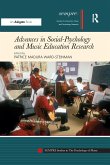Advances in Social-Psychology and Music Education Research
Herausgeber: Ward-Steinman, Patrice Madura
Advances in Social-Psychology and Music Education Research
Herausgeber: Ward-Steinman, Patrice Madura
- Gebundenes Buch
- Merkliste
- Auf die Merkliste
- Bewerten Bewerten
- Teilen
- Produkt teilen
- Produkterinnerung
- Produkterinnerung
This Festschrift honors the career of Charles P. Schmidt on the occasion of his retirement from the Indiana University Jacobs School of Music. His main research focus has been the social-psychology of music education, including the subtopics of motivation in music learning, applied music teaching behaviors, and personality and cognitive styles in music teaching and learning. Each chapter in this volume recognizes the influence of Schmidt as a researcher, a research reviewer, and a research mentor, and contributes to the advancement of the social-psychological model and to research standards in music education.…mehr
Andere Kunden interessierten sich auch für
![Advances in Social-Psychology and Music Education Research Advances in Social-Psychology and Music Education Research]() Advances in Social-Psychology and Music Education Research81,99 €
Advances in Social-Psychology and Music Education Research81,99 €![Methodological Advances in Educational Effectiveness Research Methodological Advances in Educational Effectiveness Research]() Bert P M CreemersMethodological Advances in Educational Effectiveness Research196,99 €
Bert P M CreemersMethodological Advances in Educational Effectiveness Research196,99 €![Advances in Teacher Emotion Research Advances in Teacher Emotion Research]() Paul A. Schutz / Michalinos Zembylas (ed.)Advances in Teacher Emotion Research184,99 €
Paul A. Schutz / Michalinos Zembylas (ed.)Advances in Teacher Emotion Research184,99 €![Advances in Research and Praxis in Special Education in Africa, Caribbean, and the Middle East Advances in Research and Praxis in Special Education in Africa, Caribbean, and the Middle East]() Advances in Research and Praxis in Special Education in Africa, Caribbean, and the Middle East62,99 €
Advances in Research and Praxis in Special Education in Africa, Caribbean, and the Middle East62,99 €![Advances in Research and Praxis in Special Education in Africa, Caribbean, and the Middle East (Hc) Advances in Research and Praxis in Special Education in Africa, Caribbean, and the Middle East (Hc)]() Advances in Research and Praxis in Special Education in Africa, Caribbean, and the Middle East (Hc)106,99 €
Advances in Research and Praxis in Special Education in Africa, Caribbean, and the Middle East (Hc)106,99 €![Advances in Computer-Based Human Assessment Advances in Computer-Based Human Assessment]() P.L. Dann / S.H Irvine / J.M. Collis (Hgg.)Advances in Computer-Based Human Assessment161,99 €
P.L. Dann / S.H Irvine / J.M. Collis (Hgg.)Advances in Computer-Based Human Assessment161,99 €![Advances in Community Thought and Research (Hc) Advances in Community Thought and Research (Hc)]() Advances in Community Thought and Research (Hc)106,99 €
Advances in Community Thought and Research (Hc)106,99 €-
-
-
This Festschrift honors the career of Charles P. Schmidt on the occasion of his retirement from the Indiana University Jacobs School of Music. His main research focus has been the social-psychology of music education, including the subtopics of motivation in music learning, applied music teaching behaviors, and personality and cognitive styles in music teaching and learning. Each chapter in this volume recognizes the influence of Schmidt as a researcher, a research reviewer, and a research mentor, and contributes to the advancement of the social-psychological model and to research standards in music education.
Hinweis: Dieser Artikel kann nur an eine deutsche Lieferadresse ausgeliefert werden.
Hinweis: Dieser Artikel kann nur an eine deutsche Lieferadresse ausgeliefert werden.
Produktdetails
- Produktdetails
- Verlag: Routledge
- Seitenzahl: 288
- Erscheinungstermin: 28. Juli 2011
- Englisch
- Abmessung: 240mm x 161mm x 20mm
- Gewicht: 599g
- ISBN-13: 9781409422761
- ISBN-10: 1409422763
- Artikelnr.: 40240297
- Herstellerkennzeichnung
- Libri GmbH
- Europaallee 1
- 36244 Bad Hersfeld
- gpsr@libri.de
- Verlag: Routledge
- Seitenzahl: 288
- Erscheinungstermin: 28. Juli 2011
- Englisch
- Abmessung: 240mm x 161mm x 20mm
- Gewicht: 599g
- ISBN-13: 9781409422761
- ISBN-10: 1409422763
- Artikelnr.: 40240297
- Herstellerkennzeichnung
- Libri GmbH
- Europaallee 1
- 36244 Bad Hersfeld
- gpsr@libri.de
Patrice Madura Ward-Steinman is Professor of Music Education at the Indiana University Jacobs School of Music, where she teaches choral and research methods, and serves as coordinator of graduate studies in music education. She has published articles on vocal jazz improvisation, creative thinking, urban music teaching, and the big band era in prominent research journals, and is the author of four books: Getting Started with Vocal Improvisation (1999), Becoming a Choral Music Teacher (2010), Music Education in Your Hands, with Michael L. Mark (2010), and Madura's Danceland: Images of America (2010). She also serves on the editorial committee of the Journal of Research in Music Education.
Contents: Preface; Part I Social-Psychological Advances in Music Education:
Toward a social-psychological model of musical ability, Charles P. Schmidt;
Advances in the social-psychology of music teaching and learning: one facet
of Charles P. Schmidt's teaching and research, Peter Miksza and Kevin E.
Watson; Designing effective music studio instruction, Hal Abeles; Changing
learners: the nature of expertise in music teaching, Robert A. Duke and
Da-Laine Chapman; University non-major student reactions to music
appreciation course content and instructional methods, Barbara E. Lewis;
Nonverbal measurement of responsiveness to music, Clifford K. Madsen; The
Seashore-Mursell debate on the psychology of music revisited, Estelle R.
Jorgensen; A journey in search for meaning, Anthony Kemp. Part II Social
Environments for Music Education: Development of a social environment of
instruction model for music education, Stephen F. Zdzinski; Fourth graders'
use of probability reasoning in predicting personal outcomes during music
class, Patricia J. Flowers; Choir in prison: the relationship of
psychological needs to perceptions of meaning in music, Joyce Eastlund
Gromko and Mary L. Cohen; A content analysis of band repertoire performed
at the Indiana State School Music Association state concert organization
finals, 1985-2010, Lissa Fleming May; Observations about occupational
identity among public school music teachers: past and present, Jere T.
Humphreys. Part III Advancing Effective Research in Music Education:
Charles Schmidt: a quality reviewer, Rudolf E. Radocy; Ethical issues in
music education research publishing: the research publication/presentation
code of ethics, Wendy L. Sims; Diversity of dissertation topics in music
education supervised by experienced advisors in the United States, C.
Victor Fung; Cited quantitative research articles in music education
research journals, 1990-2005: a content analysis of selected studies,
Joanne Rutkowski, Keith P. Thompson and Yi-
Toward a social-psychological model of musical ability, Charles P. Schmidt;
Advances in the social-psychology of music teaching and learning: one facet
of Charles P. Schmidt's teaching and research, Peter Miksza and Kevin E.
Watson; Designing effective music studio instruction, Hal Abeles; Changing
learners: the nature of expertise in music teaching, Robert A. Duke and
Da-Laine Chapman; University non-major student reactions to music
appreciation course content and instructional methods, Barbara E. Lewis;
Nonverbal measurement of responsiveness to music, Clifford K. Madsen; The
Seashore-Mursell debate on the psychology of music revisited, Estelle R.
Jorgensen; A journey in search for meaning, Anthony Kemp. Part II Social
Environments for Music Education: Development of a social environment of
instruction model for music education, Stephen F. Zdzinski; Fourth graders'
use of probability reasoning in predicting personal outcomes during music
class, Patricia J. Flowers; Choir in prison: the relationship of
psychological needs to perceptions of meaning in music, Joyce Eastlund
Gromko and Mary L. Cohen; A content analysis of band repertoire performed
at the Indiana State School Music Association state concert organization
finals, 1985-2010, Lissa Fleming May; Observations about occupational
identity among public school music teachers: past and present, Jere T.
Humphreys. Part III Advancing Effective Research in Music Education:
Charles Schmidt: a quality reviewer, Rudolf E. Radocy; Ethical issues in
music education research publishing: the research publication/presentation
code of ethics, Wendy L. Sims; Diversity of dissertation topics in music
education supervised by experienced advisors in the United States, C.
Victor Fung; Cited quantitative research articles in music education
research journals, 1990-2005: a content analysis of selected studies,
Joanne Rutkowski, Keith P. Thompson and Yi-
Contents: Preface; Part I Social-Psychological Advances in Music Education:
Toward a social-psychological model of musical ability, Charles P. Schmidt;
Advances in the social-psychology of music teaching and learning: one facet
of Charles P. Schmidt's teaching and research, Peter Miksza and Kevin E.
Watson; Designing effective music studio instruction, Hal Abeles; Changing
learners: the nature of expertise in music teaching, Robert A. Duke and
Da-Laine Chapman; University non-major student reactions to music
appreciation course content and instructional methods, Barbara E. Lewis;
Nonverbal measurement of responsiveness to music, Clifford K. Madsen; The
Seashore-Mursell debate on the psychology of music revisited, Estelle R.
Jorgensen; A journey in search for meaning, Anthony Kemp. Part II Social
Environments for Music Education: Development of a social environment of
instruction model for music education, Stephen F. Zdzinski; Fourth graders'
use of probability reasoning in predicting personal outcomes during music
class, Patricia J. Flowers; Choir in prison: the relationship of
psychological needs to perceptions of meaning in music, Joyce Eastlund
Gromko and Mary L. Cohen; A content analysis of band repertoire performed
at the Indiana State School Music Association state concert organization
finals, 1985-2010, Lissa Fleming May; Observations about occupational
identity among public school music teachers: past and present, Jere T.
Humphreys. Part III Advancing Effective Research in Music Education:
Charles Schmidt: a quality reviewer, Rudolf E. Radocy; Ethical issues in
music education research publishing: the research publication/presentation
code of ethics, Wendy L. Sims; Diversity of dissertation topics in music
education supervised by experienced advisors in the United States, C.
Victor Fung; Cited quantitative research articles in music education
research journals, 1990-2005: a content analysis of selected studies,
Joanne Rutkowski, Keith P. Thompson and Yi-
Toward a social-psychological model of musical ability, Charles P. Schmidt;
Advances in the social-psychology of music teaching and learning: one facet
of Charles P. Schmidt's teaching and research, Peter Miksza and Kevin E.
Watson; Designing effective music studio instruction, Hal Abeles; Changing
learners: the nature of expertise in music teaching, Robert A. Duke and
Da-Laine Chapman; University non-major student reactions to music
appreciation course content and instructional methods, Barbara E. Lewis;
Nonverbal measurement of responsiveness to music, Clifford K. Madsen; The
Seashore-Mursell debate on the psychology of music revisited, Estelle R.
Jorgensen; A journey in search for meaning, Anthony Kemp. Part II Social
Environments for Music Education: Development of a social environment of
instruction model for music education, Stephen F. Zdzinski; Fourth graders'
use of probability reasoning in predicting personal outcomes during music
class, Patricia J. Flowers; Choir in prison: the relationship of
psychological needs to perceptions of meaning in music, Joyce Eastlund
Gromko and Mary L. Cohen; A content analysis of band repertoire performed
at the Indiana State School Music Association state concert organization
finals, 1985-2010, Lissa Fleming May; Observations about occupational
identity among public school music teachers: past and present, Jere T.
Humphreys. Part III Advancing Effective Research in Music Education:
Charles Schmidt: a quality reviewer, Rudolf E. Radocy; Ethical issues in
music education research publishing: the research publication/presentation
code of ethics, Wendy L. Sims; Diversity of dissertation topics in music
education supervised by experienced advisors in the United States, C.
Victor Fung; Cited quantitative research articles in music education
research journals, 1990-2005: a content analysis of selected studies,
Joanne Rutkowski, Keith P. Thompson and Yi-








